人教版八年级下英语知识点总结
人教版八年级英语下册Unit-1--Unit-3-单元知识点归纳
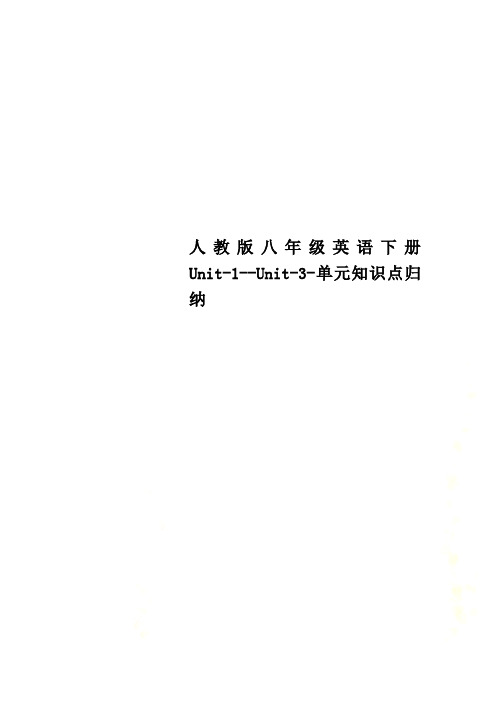
人教版八年级英语下册Unit-1--Unit-3-单元知识点归纳free【动词】使……解脱,得到自由He could not free his arm.free from21. run out用完,用尽 When his water run out, he knew that he would have to do something to save his own life.物sth. tun out. 某物用尽了。
人sb. run out of物sth..人用尽了某物。
He run out of all his money last night.22.risk sth to do sth. 冒着...的风险去做某事 take a risk=take risks 冒险risk doing ...=take the risk of doing ...23. the importance of (doing) sth.(做)某事的重要性 We students should know the importance of (learning) English.importance n. 重要(性), important adj.重要的,unimportant adj.24.decision 【名词】决定;抉择; make a decision to do sth.decide25. be in the control of …掌管,管理 The headmaster is in the control of this new school. be out of control无法控制,无法管理 be under control被控制住,在控制之中26. 【复习】mind意为介意,Would you mind my opening the window?27. give up (doing) sth. 放弃(做)某事,give up (playing) computer games;give up后可接名词、代词和动词ing形式,也可不接,如 Never give up easily.II. 重点短语1. have a fever 发烧2. have a cough 咳嗽3. have a toothache 牙疼4. talk too much 说得太多5. drink enough water 喝足够的水6. have a cold 受凉;感冒7. have a stomachache 胃疼8. have a sore back 背疼9. have a sore throat 喉咙痛10. lie down and rest 躺下来休息11. hot tea w ith honey 加蜂蜜的热茶12. see a dentist 看牙医13. get an X-ray 拍X 光片14. take one’ s temperature量体温15. put some medicine on sth. 在……上面敷药16. feel very hot 感到很热17. sound like 听起来像18. all weekend 整个周末19. in the same way 以同样的方式20. go to a doctor 看医生21. go along 沿着……走22. on the side of the road 在马路边23. shout for help 大声呼救24. without thinking twice 没有多想25. get off 下车26. have a heart problem 有心脏病27. to one’ s surprise使....... 惊讶的28. thanks to 多亏了;由于29. in time 及时30. save a/one’s life挽救生命lose one's life 31. get into trouble 造成麻烦32. right away 立刻;马上33. because of 由于34. get out of 离开;从……出萍35. hurt oneself 受伤36. put a bandage on sth. 用绷带包扎37. fa ll down 摔倒38. feel sick 感到恶心39. have a nosebleed 流鼻血40. cut his knee 割伤他的膝盖41. put her head back 把她的头向后仰42. have problems breathing 呼吸困难43. mountain climbing 登山运动44. be used to doing sth. 习惯做某事45. run out (of) 用完;用尽46. so that 以便47. so. . . that 如此… …以至于…48. be in control of 掌管;管理49. in a difficult situation 在闲境屮50. keep on doing sth. 继续或坚持做某事51. make a decision 做出决定52. take risks 冒险53. give up 放弃III. 重点语法【反身代词】英语中共有八个反身代词,在使用时应注意和它所指的相应的对象在人称、性别、数上保持一致。
最全面人教版八年级下册英语第一单元知识点归纳总结

Unit 1 What's the matter?一、词汇与短语◆重点单词A部分1.matter n. 问题;事情2.sore adj. 疼痛的;酸痛的3.stomachache n. 胃痛;腹痛4.foot n. 脚;足5.neck n. 颈;脖子6.stomach n. 胃;腹部7.throat n. 咽喉;喉咙8.hurt v. (使)疼痛;受伤9.fever n. 发烧10.passenger n. 乘客;旅客11.lie v. 躺;平躺12.break n. 间歇;休息13.rest v. &n. 放松;休息14.onto prep. 向;朝15.X-ray n. X射线;X光16.trouble n. 问题;苦恼17.toothache n. 牙痛18.hit n. (用手或器具)击;打19.headache n. 头痛20.herself pron. (she的反身代词)她自己21.off adv. & prep. 离开(某处);不工作;从……去掉B部分1.bandage n. 绷带v. 用绷带包扎2.press v. 压;挤;按3.sick adj. 生病的;有病的4.knee n. 膝;膝盖5.breathe v. 呼吸6.knife n. 刀7.sunburned adj. 晒伤的8.blood n. 血9.ourselves pron. (we反身代词)我们自己10.mean v. 意思是;打算11.climber n. 登山者;攀登者12.importance n. 重要性;重要13.risk n.&v. 危险;风险;冒险14.decision n. 决定;抉择15.accident n.(交通)事故;意外遭遇16.control v.&n. 限制;约束;管理17.situation n. 情况;状况18.spirit n. 勇气;意志19.kilo( = kilogram) n. 千克;公斤20.death n. 死;死亡21.rock n. 岩石22.nurse n. 护士◆重点短语A部分1.have a cold 感冒2.lie down 躺下3.have a stomachache 胃痛4.take one's temperature 量体温5.have a fever 发烧6.to one's surprise 使……惊讶的是7.get off 下车8.right away 立即;马上9.take breaks (take a break) 休息10.talk too much 说得太多11.drink enough water 喝足够的水12.have a very sore throat 嗓子非常疼13.get an X-ray 拍X光片14.see a dentist 看牙医15.drink some hot tea with honey 喝一些加蜂蜜的热茶16.put some medicine on sth.在……上面敷一些药17.feel very hot 感到很热18.sound like 听起来像19.all weekend 整个周末20.in the same way 以同样的方式21.go to a doctor 看医生22.go along 沿着……走23.on the side of the road 在马路边24.shout for help 大声呼救25.without thinking twice 没有多想26.have a heart problem 有心脏病27.thanks to 多亏了;由于28.in time 及时29.save a life 挽救生命30.get into trouble 陷入麻烦31.hurt oneself 受伤32.fall down落下;摔倒B部分1.be used to 习惯于……;适应于……2.in a difficult situation 在困境中3.take risks (take a risk) 冒险4.keep on doing sth. 继续(或坚持)做某事5.run out (of) 用尽;耗尽6.make a decision 作出决定7.cut off 切除8.get hit on the head 撞到头部9.get out of 离开;从……岀来10.be interested in 对……感兴趣11.give up 放弃12.mean doing sth. 意味着做某事13.put a bandage on sth. 用绷带包扎…14.lose one's life 失去生命15.feel sick 感到恶心16.mountain climbing 登山运动17.have problems breathing 呼吸困难18.be in control of 掌管;管理◆重点句子A部分1.What's the matter with you?=What's the trouble with you?=What's wrong with you?你怎么了?2.What should she do? 她该怎么办呢?3.Did you fall down? 你跌倒了吗?4.Should I take my temperature? 我应该量一下体温吗?5.I think I sat in the same way for too long without moving.我想我以同样的姿势一动不动地坐得太久了。
人教版Go for it!八年级下册英语各单元知识点总结

人教版Go for it!八年级下册英语各单元知识点总结Unit 1 What’s the matter?重点:1、态动词should & shouldn’t 的用法;2、have + 疾病;3. 反身代词的用法。
难点:能询问并表述身体的种.种不适以及对他人身体的种.种不适给予适当的建议。
知识点:What’s the matter? 怎么了? What’s the matter with you? = What’s the trouble with you? = What’s wrong with you? 你怎么了?have a cold = catch a cold 感冒have a stomachache 胃痛have a sore + 部位……痛lie down 躺下take one’s temperature 量体温have a fever 发烧have a cough 咳嗽take breaks 休息get an X-ray 拍X光片away from 远离on the side of the road 在马路边shout for help 大声呼救get off 下车to one’s surprise 出乎某人意料thanks to 多亏;由于in time 及时right away 马上,立即get into 陷入get into trouble 陷入困境have a toothache 牙痛put one’s head down 低头have a nosebleed 流鼻血put a bandage on sth. 用绷带包扎get hit on the head 砸到头(注意v.+ on the + 身体部位的表达方达) be interested in 对……感兴趣There were many times when …(when 引导的定语从句)be used to doing sth. 习惯做某事take risks 冒险because of 因为in …situation 处于……境地run out 用光get out of 逃离of importance = important (of + n. = adj.) be in control of 管理make a decision 做决定give up 放弃Unit 2 I’ll help to clean up the city parks.重点&难点:1、不定式作宾语、状语和宾补的用法;2、could表建议时的用法;3、掌握短语:run out of, take after, fix up, give away等;4. 学会用will 和would like表达意愿。
人教版八年级英语下册知识点总结
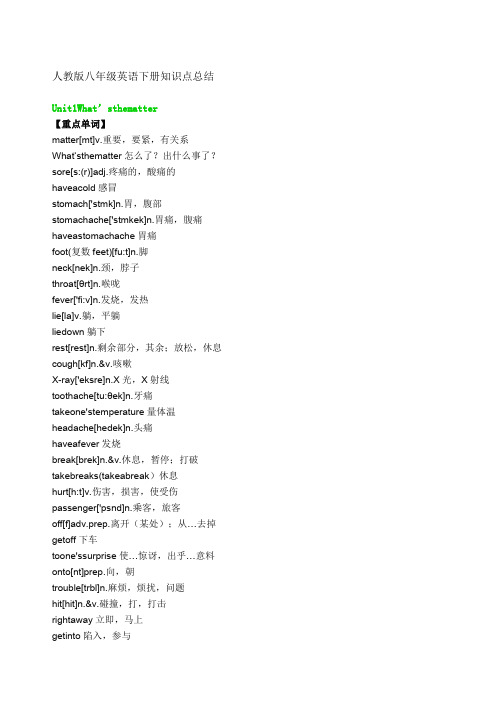
人教版八年级英语下册知识点总结Unit1What’sthematter【重点单词】matter[mt]v.重要,要紧,有关系What’sthematter怎么了?出什么事了?sore[s:(r)]adj.疼痛的,酸痛的haveacold感冒stomach['stmk]n.胃,腹部stomachache['stmkek]n.胃痛,腹痛haveastomachache胃痛foot(复数feet)[fu:t]n.脚neck[nek]n.颈,脖子throat[θrt]n.喉咙fever['fi:v]n.发烧,发热lie[la]v.躺,平躺liedown躺下rest[rest]n.剩余部分,其余;放松,休息cough[kf]n.&v.咳嗽X-ray['eksre]n.X光,X射线toothache[tu:θek]n.牙痛takeone'stemperature量体温headache[hedek]n.头痛haveafever发烧break[brek]n.&v.休息,暂停;打破takebreaks(takeabreak)休息hurt[h:t]v.伤害,损害,使受伤passenger['psnd]n.乘客,旅客off[f]adv.prep.离开(某处);从…去掉getoff下车toone'ssurprise使…惊讶,出乎…意料onto[nt]prep.向,朝trouble[trbl]n.麻烦,烦扰,问题hit[hit]n.&v.碰撞,打,打击rightaway立即,马上getinto陷入,参与herself[h:self]pron.她自己,她本身(she的反身代词)bandage['bndd]n.&v.绷带;用绷带包扎sick[sk]adj.患病的,不适的knee[ni:]n.膝盖nosebleed[nzbli:d]n.鼻出血breathe[bri:e]v.呼吸sunburned[snb:nd]adj.晒伤的ourselves[ɑ:selvz]pron.我们自己(we的反身代词)climber[klam(r)]n.登山者beusedto习惯于…适应于…risk[rsk]n.&v.风险,危险;冒险takerisks(takearisk)冒险accident[ksidnt]n.意外事件;事故situation[sitjuein]n.状况,形式,情况kg=kilogram[klgrm]n.公斤,千克rock[rk]n.岩石runout(of)用尽,耗尽knife[naif]n.刀,餐刀cutoff切除blood[bld]n.血mean[mi:n]v.意味着,意思是,意欲getoutof离开,从…出来importance[mp:tns]n.重要性decision[d'sn]n.决心,决定,抉择control[kn'trl]v.控制,支配,操纵beincontrolof掌管,管理spirit['sprt]n.勇气,意志death[deθ]n.死亡giveup放弃nurse[n:s]n.护士【重点短语】1.haveafever发烧2.haveacough咳嗽3.haveatoothache牙疼4.talktoomuch说得太多5.drinkenoughwater喝足够的水6.haveacold受凉;感冒7.haveastomachache胃疼8.haveasoreback背疼9.haveasorethroat喉咙痛10.takerisks冒险11.hotteawithhoney加蜂蜜的热茶12.seeadentist看牙医13.getanX-ray拍X光片14.takeone’stemperature量体温15.putsomemedicineonsth.在……上面敷药16.giveup放弃17.soundlike听起来像18.allweekend整个周末19.inthesameway以同样的方式20.gotoadoctor看医生21.goalong沿着……走22.onthesideoftheroad在马路边23.shoutforhelp大声呼救24.withoutthinkingtwice没有多想25.getoff下车26.haveaheartproblem有心脏病27.toone’ssurprise另某人惊讶的是28.thanksto多亏了;由于29.intime及时30.makeadecision做出决定31.getintotrouble造成麻烦32.rightaway立刻;马上33.becauseof由于34.getoutof离开;从……出来35.keepondoingsth.继续或坚持做某事36.putabandageonsth.用绷带包扎37.falldown摔倒38.feelsick感到恶心39.haveanosebleed流鼻血40.cuthisknee割伤他的膝盖41.putherheadback把她的头向后仰42.haveproblemsbreathing呼吸困难43.mountainclimbing登山运动44.beusedtodoingsth.习惯做某事45.runout(of)用完;用尽46.sothat以便47.so...that...如此……以至于...…48.beincontrolof掌管;管理49.inadifficultsituation在闲境中【重点句型】1.What'sthematterwithyou=What'thetroublewithyou=What'swrongwithyou你怎么了?2.Whatshouldshedo她该怎么办呢?3.ShouldItakemytemperature我应该量一下体温吗?4.Youshouldliedownandrest.你应该躺下休息一会儿。
人教版英语八年级下册1-4单元知识点总结
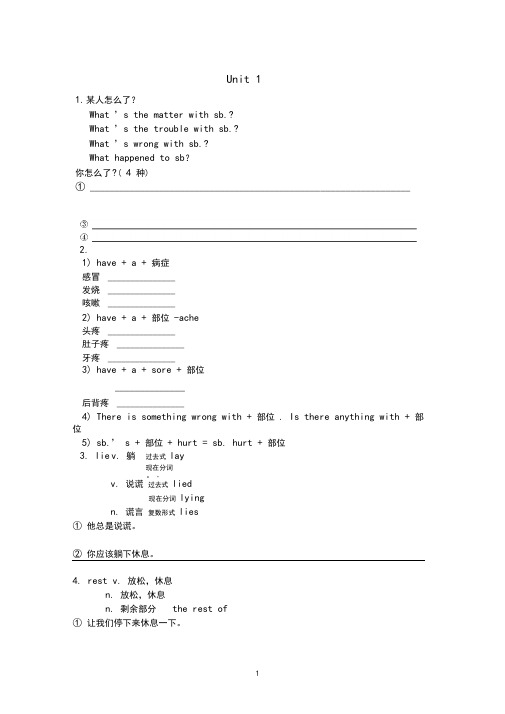
我们应该为孩子们提供一个干净舒适的环境。
①
5.mind (sb) doing sth介意做某事
你介意我打开窗户吗?
6.It is+adj.+ (for/of sb)+to do sth
形式主语真正主语
(1)当形容词描述的是人的性格、品质时用of
1这个司机看到一个老人正躺在路边。
2我经常看到他打篮球。
15.get on上车
get off下车
我们将要在下一站下车。
16.think of想起
think about考虑
think up想出
这个司机没有考虑他自己。
17.thanks to多亏;由于thanks for由于而感谢
①谢谢你邀请我参加晚会。
21.so that为了;以便
21.1.that...如此以至于
①这个地方是如此的美丽以至于他不想返回家了。
②为了赶上早班车,他每天起得很早。
22.sick既可作定语,也可做表语
ill作表语
①他生病了。
②他是一个生病的孩子。
Unit
1.volunteer to do sth义务做某事
他义务去打扫城市公园。
use up
他上个月底用光了他的钱。
8.mean doing sth意味着做某事
mean to do sth打算/计划做某事
mean that从句表示
1这意味着处在一个困难的情况中。
2我打算今天把这本书给你,但是我忘了。
3红灯表示你必须停下来。
9.the importance of的重要性
我们应该知道做好的决定的重要性。
人教版八年级英语下册各单元知识点总结完整版

Unit 1 What’s the matter?一、重点短语1. have a fever 发烧2. have a cough 咳嗽3. have a toothache 牙疼4. talk too much 说得太多5. drink enough water 喝足够的水6. have a cold 受凉;感冒7. have a stomachache 胃疼8. have a sore back 背疼9. have a sore throat 喉咙痛10. lie down and rest躺下来休息11. hot tea with honey加蜂蜜的热茶12. see a dentist看牙医13. get an X-ray拍X光片14. take one’ s temperature量体温15. put some medicine on sth在……上面敷药16. feel very hot 感到很热17. sound like 听起来像18. all weekend 整个周末19. in the same way以同样的方式20. go to a doctor 看医生21. go along 沿着……走22. on the side of the road 在马路边23. shout for help 大声呼救24. without thinking twice 没有多想25. get off 下车26. have a heart problem 有心脏病27. to one’ s surprise 使……惊讶的28. thanks to 多亏了;由于29. in time及时30. save a life 挽救生命31. get into trouble 造成麻烦32. right away 立刻;马上33. because of 由于34. get out of 离开35. hurt oneself 受伤36. put a bandage on sth. 用绷带包扎37. fall down 摔倒38. feel sick 感到恶心39. have a nosebleed 流鼻血40. cut his knee割伤他的膝盖41. put her head back 把她的头向后仰42.have problems breathing呼吸困难43. mountain climbing登山运动44. be used to doing sth. 习惯做某事45. run out (of) 用完;用尽46. so that 以便47. so…that 如此……以至于……48. be in control of 掌管;管理49. in a difficult situation 在逆境屮50. keep on doing sth.坚持做某事51. make a decision做出决定52. take risks 冒险53. give up 放弃二、知识点解析1. What’s the matter? 怎么了?若是询问“某人怎么了?”要用“What’s the matter with sb.?”拓展:What’s the matter with sb.? 的同义句:What’s wrong with sb.? / What’s the trouble with sb.?2.疾病类短语:have a +疾病. e.g. :have a fever 发烧have a cold 感冒have a cough 咳嗽.have a +身体部位-ache. e.g.: have a headache 头痛have a toothache 牙痛.have a sore+身体部位. e.g.: have a sore throat咽喉痛have a sore back背痛例题:Mom, I____________.I’m sorry to hear that, dear. We must go to see the dentist right away.A. have a headacheB. have a stomachacheC. have a toothacheD. have a fever3. lie down 躺下V. 躺,平躺。
人教版英语八年级下册知识点

Unit 1 What’s the matter?一、重点短语1. have a fever 发烧2. have a cough 咳嗽3. have a toothache 牙疼4. have a sore back 背疼5. have a sore throat 喉咙痛6.have a cold 受凉;感冒7. have a nosebleed 流鼻血8.have a heart problem 有心脏病9.have a stomachache 胃疼10.have problems breathing 呼吸困难11. talk too much 说得太多12. drink enough water 喝足够的水13. lie down and rest 躺下来休息14. hot tea with honey 加蜂蜜的热茶15. see a dentist 看牙医16. get an X-ray 拍X 光片17. take one’s temperature 量体温18. feel very hot 感到很热19. go along 沿着……走20. go to a doctor 看医生21. get off/on 下车/上车22. get into trouble 造成麻烦23. get into/out of 进入/从……出来24. be in control (of) 掌管;管理25.be out of control(of)失控26. thanks to 多亏了27. on the side of the road 在马路边28. shout for help 大声呼救29. put some medicine on sth. 在…上面敷药30. all weekend 整个周末31.put a bandage on sth. 用绷带包扎32. hurt oneself 受伤33. to one’s surprise 使....... 惊讶的34.fall down 摔倒35. without thinking twice 没有多想36. save a life 挽救生命37. put her head back 把她的头向后仰38. cut his knee 割伤他的膝盖39. be used to doing sth. 习惯做某事40. used to do过去常常41. in the same way 以同样的方式42. sound like 听起来像43. make a decision 做出决定44. because of 由于45. mountain climbing 登山运动46. feel sick 感到恶心47. in a difficult situation 在困境中48. take risks 冒险49. keep on doing sth. 继续做某事50. give up (doing) sth. 放弃51. run out (of) 用完;用尽52. in time 及时on time准时53. right away/at once 立刻54. so that 以便二、重点语法1.What’s th e matter(with sb)?怎么了?询问麻烦事或身体状况=What’s the trouble (with sb)?=What’s the problem (with sb)?=What’s up?=What’s your trouble/problem?2.1.) have a+名词,表示某种病have a cough咳嗽2.)sore也可表疾病have a sore back/throat背疼/喉咙痛3. need有两种词性,实义动词和情态动词实义动词:1. need sth 2. need (sb) to do 3. don’t need.....情态动词:1. need+原型2. Need I ....? 肯Yes,you must. 否No, you needn’t.4.see sb do sth看见某人做某事(强调全过程)see sb doing sth看见某人正在做某事(强调正在发生)5.expect sth期待某物agree with sb同意某人expect(sb) to do 期待做某事agree to do同意做某事expect+that从句期待agree+that从句6.have trouble/problems in doing sth 做某事有困难7.trouble用法:1).be in trouble处于困境2).get(sb) into trouble(使某人)陷入困境8.词组辨析:used to do过去常常be used to doing习惯于做9.so...that+从句如此...以至于so that为了,目的是引导目的状语从句(当主句主语与从句主语一致时可用in order to)Eg: He works hard so that he can succeed=He works hard in order to succeed.10.What’s the meaning of...?=What does...mean?....的意思是什么?11.反身代词:myself, yourself, himself, herself, itself, ourselves, yourselves, themselvesteach oneself,enjoy oneself,dress oneself,introduce oneself,help oneself12.躺:lie-lay-lain-lying 说谎:lie-lied-lied-lying下蛋:lay-laid-laid-laying(规则的撒谎,不规则的躺,躺过就下蛋)Unit 2 I ’ll help to clean up the city parks.一、重点短语1. Clean-Up Day 清洁日2. an old people’s home 养老院3. help out with sth. 帮助解决困难4. used to do sth.过去常常做某事5. care for 关心;照顾6. the look of joy 快乐的表情7. at the age of 在......岁时8. clean up 打扫(或清除)干净9. cheer up (使)变得更高兴;振奋10. give out 分发;散发11. come up with 想出;提出12. make a plan 制订计划13. make some notices 做些公告牌14. try out 试用;试行15. work for 为…工作;为…. 效力16. put up 建造;举起;张贴17. hand out 分发;散发;发给18. call up 打电话;召集19. put off 推迟;延迟20. for example 比如;例如21. raise money 筹钱;募捐22. take after 与......相像;像23. give away 赠送;捐赠24. fix up 修理;修补;解决25. be similar to 与……相似26. set up 建立;设立27. disabled people 残疾人28. make a difference 影响;有作用29. be able to 能够30. after-school reading program课外阅读项目31.a feeling of satisfaction满足感32.several hours若干小时33.volunteer to do自愿做34.sick kids生病的孩子35.homeless people无家可归的人36.be busy with sth忙于37.disabled people残疾人38.a trained dog一只受过训的狗39.book lover爱书者40.think up想出二、重点语法1. notice sb do sth注意到某人做过某事,notice sb doing sth注意到某人正在做某事3.satisfaction用法:1.)satisfy v. satisfy sb 使某人满意2.)satisfied/satisfying adj. be satisfied with对...满意3.)satisfaction n. to one’s satisfaction令某人满意4.owner用法:1.)the owner of...的主人the owner of the shop 2.)one’s own+名词my own shop5. sick adj. 定语,表语sickness n.ill adj. 表语illness n. He is ill.=He is sick. Here is a sick dog.5.raise 及物动词rise 不及物动词The sun rises. Raise your hands.6.take after像(品质,外貌)look like像(外貌)7.imagine+动名词/名词/代词imagine sb doing8.have trouble/problems/difficulty in doing做某事有困难He has trouble in learning English.9.形容词+ness变名词:kind-kindness,ill-illness,sick- sickness, sad-sadness,happy-happiness,busy-business,fair-fairness10.句型辨析:It is clever/smart/kind/nice/friendly of sb to 某人做某事是...的It is +adj+for sb to do 做某事对某人来说是...的11.change one’s mind改变主意change green into yellow由绿变黄12.be interested in=have an interest in 对...感兴趣Unit 3 Could you please clean your room?一、重点短语1.go out for dinner 出去吃饭2. stay out late 在外面待到很晚3. go to the movies 看电影4. take sb. for a walk 带某人去散步5.all day/evening 整曰/夜6.do housework 做家务7. get a ride 搭车8. work on 从事9. finish doing sth. 完成做某事10. clean and tidy 干净整洁11. do the dishes 洗餐具12. take out the rubbish 倒垃圾13. fold the clothes 叠衣服14. sweep the floor 扫地15. make the bed 整理床铺16. as a result结果17. help out 帮忙18. get good grades取得好成绩19. throw down 扔下20.as soon as=the minute 一...就...21. come over 过来22.shout back 大声回应23.walk away 走开24.all the time 一直;总是25.share the housework 分担家务26. a comfortable home 一个舒适的家27.in surprise 惊讶地28. get something to drink 拿点喝的东西29.hang out 闲逛30. watch one show 观看一个节目31. pass sb. sth. 把某物传给某人32. lend sb. sth. 把某物借给某人33. get sth. wet 使某物弄湿34. hate to do sth. 讨厌做某事35. do chores 做杂务36. help sb. (to ) do /with sth 帮助某人干某事37.bring a tent带顶帐篷来38. buy some snacks买些小吃39. go to the store去商店40. invite sb. to a party邀请某人参加聚会41. make sb. do sth. 使某人做某事42. enough stress足够的压力43.a waste of time浪费时间44. in order to为了45. provide sb with sth=provide sth for sb46. mind doing sth. 介意做某事47. depend on依赖;依靠48. look after/take care of 照顾;照看49. develop children’s independence发展孩子的独立性50. do one’s part in (doing ) sth.做某人分内的事51. come home from school/ work放学/下班回家二、重点语法1.Could you please(not) do sth ?用于提出请求,希望得到对方肯定回答,语气较委婉。
人教版八年级下册英语——知识点语法归纳总结
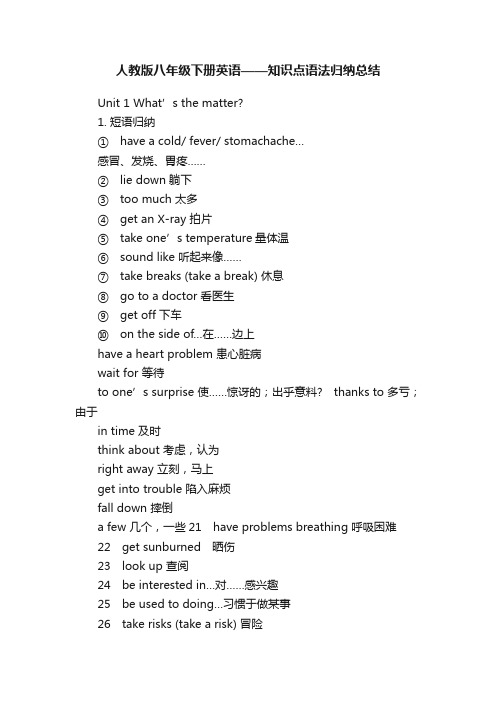
人教版八年级下册英语——知识点语法归纳总结Unit 1 What’s the matter?1. 短语归纳①have a cold/ fever/ stomachache…感冒、发烧、胃疼……②lie down 躺下③too much 太多④get an X-ray 拍片⑤take one’s temperature量体温⑥sound like 听起来像……⑦take breaks (take a break) 休息⑧go to a doctor 看医生⑨get off 下车⑩on the side of…在……边上have a heart problem 患心脏病wait for 等待to one’s surprise 使……惊讶的;出乎意料? thanks to 多亏;由于in time 及时think about 考虑,认为right away 立刻,马上get into trouble 陷入麻烦fall down 摔倒a few 几个,一些21 have problems breathing 呼吸困难22 get sunburned 晒伤23 look up 查阅24 be interested in…对……感兴趣25 be used to doing…习惯于做某事26 take risks (take a risk) 冒险27 lose one’s life 丧生28 became of 因为29 run out (of) 用尽,耗尽30 be ready to do sth. 准备做某事31 cut off 切除32 climb down 爬下33 get out of 离开;从……出来34 tell of 讲述35 the importance of (doing sth.) (做某事的)重要性36 be in control of 掌管,管理37 make a decision 做决定38 keep on doing sth. 坚持做某事39 give up 放弃40 cut/ hurt oneself 使自己受伤2. 典句必背①What’s the matter?②I have a stomachache.③What should I do?④Should I take my temperature?⑤I think you should lie down and rest.⑥If your head and neck still hurt tomorrow, then go to a doctor.⑦His love for mountain climbing is so great that he kept on climbing mountains even after this experience.3. 用法集萃(1) 当别人心情不好,身体不适或遇到麻烦时,我们可以用如下表达表示关心:What’s the matter?What’s the matter with you?What’s wrong with …?What’s the trouble\problem with …?(2) 英语中常用have描述身体的不适,此时have意为“患有”,常用结构:①have a + 疾病例:have a cold 感冒;have a fever 发烧;have a cough 咳嗽②have a + 身体部位-ache例:have a headache 头痛;have a toothache 牙痛③have a sore + 身体部位例:have a sore throat 咽喉痛;have a sore back 背痛(3) lie down躺下;tell lies/a lie 说谎含义过去式过去分词躺;平躺lay lain位于撒谎;说谎lied lied(4) maybe & may be①maybe,“或许”,常用于句首,表示可能性,后加句子。
人教版八年级英语下册各知识点归纳总结

人教版八年级英语下册各知识点归纳总结Unti1what’sthematter?短语归纳1.toomuch太多2.liedown躺下3.getanX-ray做个X光检查4.takeone’stemperatu量r e体温5.putsomemedicineon......在....上敷药6.haveafever发烧7.takebreaks/takeabreak休息8.withoutthinkingtwice没多想9.getoff下车10.takesbtothehospital送某人去医院11.waitfor等待12.toone’ssurpris使e.......惊讶的13.thanksto多亏于;由于14.intime及时15.thinkabout考虑16.haveaheartproblem患有心脏病17.getintothetrouble遇到麻烦18.dotherightthing做正确的事情事情19.falldown摔倒20.put......onsth把...放在某物上21.gethit/sunburned摔伤/烧伤22.beinterestedin对.....感兴趣23.beusedto习惯于....24.takerisks/takearisk挑战25.loseone’sl失ife去生命26.becauseof因为27.runoutof用完28.cutoff切除29.getoutof从...出来30.makeadecision/decisions做决定31.beincontrolof掌管;管理32.giveup放弃用法归纳1.needtodosth.需要去做某事2.seesbdoingsth看见某人正在做某事3.asksbsth询问某人某事4.expectsbtodosth期望某人做某事5.agreetodosth同意做某事6.helpsb(to)dosth帮助某人做某事7.wanttodosth想要做某事8.tellsbtodosth告诉某人做某事9.haveproblems(in)doingsth做某事有困难esthtodosth用某物去做某事11.be/getusedtodoingsth习惯于做某事12.seemtodosth好似做某事13.keepondoingsth继续做某事14.minddoingsth介意做某事语法点1.询问某人的XX问题及遇到麻烦的表达方法2.情态动词should的用法3.不定代词的用法精细解读1.What’sthematter(withyou)?怎么了?出什么事了?What’s thetrouble/theproblem/wrongwithsb./sth.?2.Ihadacold.我感冒了。
人教版八年级下册英语Unit5知识点总结

人教版八年级下册英语Unit5知识点总结一、语法知识点A部分知识点1.过去进行时❶ 去进行时的构成及用法过去进行时由“助动词(was/were)+动词-ing”构成,表示在过去某一时刻或某一时间段正在进行的动作。
这一特定的过去时间除有上下文暗示以外,一般用过去的时间状语来表示。
如:then, at that time, at this time yesterday, at 10:00 yesterday morning, all right以及when/while从句等。
❶ 表示过去时间点正在进行的动作。
此时常伴明确的过去时间点等。
eg:She was reading a book at this time yesterday.昨天这个时候她正在看书。
(过去时间点正在进行的动作)I was watching TV then. 那时我正在看电视。
(过去时间点正在进行的动作)❶ 表示过去的某个阶段持续的动作。
eg:She was watching TV when the phone rang.(过去一段时间内持续的动作)她正在看电视,这时电话铃响了。
❶ 表示这一阶段反复发生的动作,带有褒贬感情色彩。
此时常伴有频度副词always等。
eg:The girl was always changing her mind.(过去反复发生的动作,带有感情色彩)这个女孩老是改变主意。
❶ 表示过去动作延迟到以后发生,即用过去进行表过去将来,此类动词是一些位置的变化的词。
eg:He told me that he was going soon.(过去进行表将来)他告诉我他很快就要走了。
❶ 过去进行时的一般疑问句句型:Be(Was/Were)+主语+现在分词+其他?肯定回答:Yes,主语+be(was/were).否定回答:No,主语+be(was/were) not.eg:--Were you cooking at that time? 那时,你在做饭吗?--Yes, I were.是的。
(完整版)Unit1人教版八年级英语下册语法与知识点,推荐文档

Unit 1第一部分:Grammar一、情态动词(Modal Verbs)情态动词should 意为“应该,应当”,必须和后面的动词原形一起构成谓语,没有人称和数的变化。
用以表达职责和义务、提出劝告,而且表述的是自己的主观看法。
注意:should 在以why,who,how 等疑问词开头的问句中,意为“竟然,居然,怎么会”,表示意外、惊喜或在说话人看来是不可思议的。
三、反身代词表示反射或强调的代词叫做反身代词。
反身代词是由第一人称、第二人称形容词性物主代词或第三人称代词的宾格形式,词尾加self 或selves 组成。
反身代词可译“本人”、“本身”,为加强语气,也常翻译为“亲自”、“自己”。
不定人称代词one ---- o neself.第二部分:单词用法Section A1.What’s the matter?怎么了?该句常用询问某人患了何种疾病或遇到了什么麻烦,其后用with 引出对象。
1). What’s the matter with sb.?=what’s wrong with sb.?=what’s the trouble/problem with sb.?=what’s one’s trouble/problem?e.g. What’s the matter w ith Tom?=what’s with Tom?=What’s the with Tom?=What’s Tom’s?2). matter, 名词,“问题,事情”e.g. We have important (matter) to discuss.我们有些重要的问题要讨论。
3). 动词,“要紧,关系重大”e.g. It dosen’t that you came late.2.I have a cold. 我感冒了。
1).have/get/catch a cold “感冒,着凉”The old man a cold yesterday.那位老人昨天感冒了。
人教版八年级英语下册全册知识点考点整理

八年级英语下册全册各单元知识点考点整理Unit 1 what's the matter?一、重点短语1.too much太多2.lie down躺下3.get an X-ray做个X光检查4.take one’s temperature量体温5.put some medicine on......在....上敷药6.have a fever发烧7.take breaks/take a break休息8.without thinking twice没多想9.get off下车10.take sb to the hospital送某人去医院11.wait for等待12.to one’s surprise使.......惊讶的13.thanks to多亏于;由于14.in time及时15.think about考虑16.have a heart problem患有心脏病17.get into the trouble遇到麻烦18.do the right thing做正确的事情事情19.fall down摔倒20.put......on sth把...放在某物上21.get hit/sunburned摔伤/烧伤22.be interested in对.....感兴趣23.be used to习惯于....24.take risks/take a risk挑战25.lose one’s life失去生命26.because of因为27.run out of用完28.cut off切除29.get out of从...出来30.make a decision/decisions做决定31.be in control of掌管;管理32.give up放弃主要句型1.It’s+形容词+for sb.+to do sth.做某事对某人来说是…的。
It’s important to do sth.做某事很重要。
人教版英语八年级下册Unit8英语知识点总结

人教版英语八年级下册Unit8英语知识点总结Unit 8 English Knowledge Summary1.Island: on the island。
an island。
An island is a piece of land surrounded by water。
We use "on the island" XXX" is used to refer to a specific island.2.Full of: full of something。
filled with something。
Full of" is often followed by a noun。
which together form a post-XXX。
"Full of" is XXX "filled with." For example。
"the basket full of apples," "the cup full of water." "Full of" can also be used with the verb "be" to form the XXX。
"Be full of" is equivalent to "be filled with." For example。
"The classroom is full of students" is the same as "The classroom is filled with students." "The box is full of apples" is the same as "The box is filled with apples."3.Already and yet。
人教版英语八年级下册知识点总结

八年级英语下册语法知识复习1.should 情态动词,应该,应当,用于询问,提出建议,或表达职责和义务。
如:What should I do? You should have a talk with your parents。
could 也可以提出建议,比较委婉.如: You could write him a letter。
could还用于礼貌地请求,如:Could you please clean your room? 否定句式:Could you please not do sth?其他常用情态动词:must必须,have to必须,不得不,may可能,可以,can能,会,可能,可以need需要。
情态动词+动词原形作谓语。
2.非谓语动词形式(一)动词不定式结构:to+动词原形或不带to。
否定:not+to do或not do句法功能:1)主语:常用it作形式主语,不定式为真正的主语:It is +形容词+for sb。
to do sth.It is important to keep fit。
=To keep fit is important.2)宾语:(1)直接宾语:想,喜欢,希望:want,like, love,would like,hope, expect;决定同意拒绝开始学习:decide,agree, refuse, begin,start, learn, 需要计划帮助提供:need, plan,help,offer+ to do(划线的动词还可以接doing)如:I’ll help to clean up the city parks。
(宾语)疑问词(what, who, which,where, when ,how,)+to do 作宾语I don’t know what to say. 我不知道说什么。
(2)宾补:tell,ask,want,wish,allow,invite,help,encourage,teach等+ sb. to do (hope不能接sb。
人教版八年级英语下册复习知识点

人教版八年级英语下册复习知识点八年级英语下册复习知识1What were you doing when the rainstorm came?1. arrive at 到达(小地方)arrive in到达(大地方)reach 到达get to 到达I arrived in Beijing last night. = I reached Beijing last night .= I got to Beijing last night .如果宾语是副词here, there, home, 要把at/in/to省略。
arrive here/there/homeget here/there/home2. in front of… 在… 的前面 (某一范围外的前面)in the front of … 在… 的前面(某一范围内的前面)There are some big trees in front of the classroom building. 在教室的前面有一些大树。
I like sitting in the front of the taxi. 我喜欢坐在出租车的前排位置。
3. take off(1)起飞When did the plane take off yesterday? 飞机什么时候起飞?(2)脱下(衣帽等)He took off his coat as soon as he went into the room. 他一进房间就脱掉了外套。
(3)取消They will take off the 5 am train . 他们取消了早上5点的火车。
4. get out (of ) … 从……离开/出去/下来A car stopped and a girl got out of it.但从汽车/火车/船/飞机/马匹上下来, 用get off…5. follow(1)跟随 I followed him up he hill. 我跟着他上了山.(2)沿着……前进 Follow this road until you get to the post office. 顺着这条路一直到邮局.(3)听懂,理解Could you speak more slowly? I can’t follow you. 你能说慢点吗?我听不懂。
八年级下册人教版英语第一单元3a知识点

八年级下册人教版英语第一单元3a知识点在八年级下册人教版英语第一单元3a的学习中,我们需要掌握以下几个知识点:1. 一般现在时态一般现在时态表示经常发生的动作,习惯或者事实。
它的构成是:主语+动词原形(第三人称单数加s)。
例如:He usually goes to school by bus.(他通常乘公交车上学。
)2. 一般过去时态一般过去时态表示过去某个时间发生的动作或者事件。
它的构成是:主语+动词过去式。
例如:I watched TV last night.(我昨晚看电视了。
)3. 句子的基本结构英语句子的基本结构是:主语+谓语+宾语。
其中,主语通常是表示动作的人或物;谓语是说明主语动作或者状态的动词;宾语是接受动作的人或物。
例如:She eats an apple.(她吃了一个苹果。
)4. 形容词和副词的用法形容词用来描述名词或代词的特征或状态,放在名词或代词之前。
例如:The tall boy is my brother.(那个高个子的男孩是我弟弟。
)副词用来描述动词、形容词或其他副词的状态或特征,放在所修饰词的后面。
例如:She sings well.(她唱歌唱得很好。
)5. 物主代词的用法物主代词用来代替名词或代词所表示的人或物的所有格,分为形容词性物主代词和名词性物主代词。
形容词性物主代词用来修饰名词,放在名词之前;名词性物主代词则直接代替名词。
例如:She is my sister.(她是我的妹妹。
)以上就是八年级下册人教版英语第一单元3a知识点的简要介绍,希望能够对同学们的英语学习有所帮助。
当然,光掌握这些知识点还不够,还需要在实际学习和应用中不断去巩固和提高自己的语言技能。
人教版初中英语八年级下册全册各单元知识点、语法归纳整理
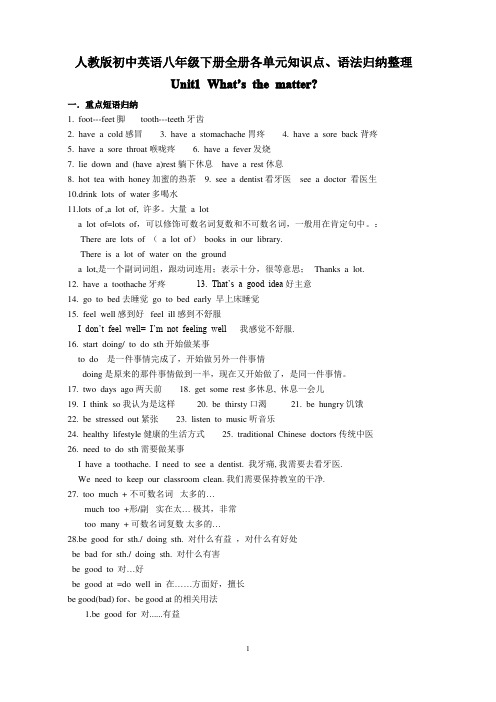
人教版初中英语八年级下册全册各单元知识点、语法归纳整理Unit1W hat’s the matter?一.重点短语归纳1.foot---feet脚tooth---teeth牙齿2.have a cold感冒3.have a stomachache胃疼4.have a sore back背疼5.have a sore throat喉咙疼6.have a fever发烧7.lie down and(have a)rest躺下休息have a rest休息8.hot tea with honey加蜜的热茶9.see a dentist看牙医see a doctor看医生10.drink lots of water多喝水11.lots of ,a lot of,许多。
大量a lota lot of=lots of,可以修饰可数名词复数和不可数名词,一般用在肯定句中。
:There are lots of(a lot of)books in our library.There is a lot of water on the grounda lot,是一个副词词组,跟动词连用;表示十分,很等意思;Thanks a lot.12.have a toothache牙疼13.That’s a good idea好主意14.go to bed去睡觉go to bed early早上床睡觉15.feel well感到好 feel ill感到不舒服I don’t feel well=I’m not feeling well我感觉不舒服.16.start doing/to do sth开始做某事to do是一件事情完成了,开始做另外一件事情doing是原来的那件事情做到一半,现在又开始做了,是同一件事情。
17.two days ago两天前18.get some rest多休息,休息一会儿19.I think so我认为是这样20.be thirsty口渴21.be hungry饥饿22.be stressed out紧张23.listen to music听音乐24.healthy lifestyle健康的生活方式25.traditional Chinese doctors传统中医26.need to do sth需要做某事I have a toothache.I need to see a dentist.我牙痛,我需要去看牙医.We need to keep our classroom clean.我们需要保持教室的干净.27.too much+不可数名词太多的…much too+形/副实在太…极其,非常too many+可数名词复数太多的…28.be good for sth./doing sth.对什么有益,对什么有好处be bad for sth./doing sth.对什么有害be good to对…好be good at=do well in在……方面好,擅长be good(bad) for、be good at的相关用法1.be good for对......有益Doing morning exercises is good for your health.做早操对你们的建康有益。
人教版八年级下册英语知识点总结

人教版八年级下册英语知识点总结英语知识点Unit 1 What ’s the matter?一、重点短语1. have a fever 发烧2. have a cough 咳嗽3. havea toothache 牙疼 4. talk too much说得太多 5. drink enough water 喝足够的水 6. have a cold 受凉 ; 感冒 7. have astomachache 胃疼 8. have a sore back 背疼 9. have a sore throat 喉咙痛 10. lie downand rest 躺下来休息 11. hot tea w ith honey 加蜂蜜的热茶 12. see a dentist 看牙医13. get an X-ray 拍 X 光片14. take one’ s temperature 量体温 15. put some medicineon sth. 在,, 上面敷药 16. feel very hot 感到很热17. sound like 听起来像 18. allweekend 整个周末 19. in the same way ? 以同样的方式 20. go to a doctor 看医生 21. goalong 沿着,, 走 22. on the side of the road 在马路边 23. shout for help 大声呼救24. without th inking twice 没有多想 25. get off 下车 26. have a heart problem 有心脏病27. to one ’ s surprise 使 [ 京讶的 28. thanks to 多亏了;由于 29. intime 及时 30. save a life 挽救生命 31. get into trouble 造成麻烦 32. right away 立刻;马上 33. because of 由于 34. get out of 离开; 从,, 出萍 35. hurt oneself 受伤36. put a bandage on sth. 用绷带包扎 37. fa ll down 摔倒 38. feel sick 感到恶心 39.have a nosebleed 流鼻血 40. cut his knee 割伤他的膝盖 42. have problems breathing 呼吸困难 43. mountain climbing 登山运动 44. be used to doing sth. 习惯做某事 45. runout (of) 用完 ; 用尽 46. so that 以便 47. so. . . that 如此, , 以至于, 48. be incontrol of 掌管; 管理 49. in a d iffic u lt situation 在闲境屮 50. keep on doing sth.继续或坚持做某事 51. make a decision 做出决定 52. take risks 冒险 53. give up 放弃二、重点句型1. What’ s the matter? What’ s the matter with you? = What’s the trouble with you?= What’ s wrong with you? 你怎么了 2. W hatshould she do? 她该怎么办呢?Should I take my temperature? 我应该量一下体温吗?主语+ should/shouldn ’t + 动词原形. .. ①You should lie down and rest. 你应该躺下休息一会儿。
人教版初中英语八年级下册语法知识点
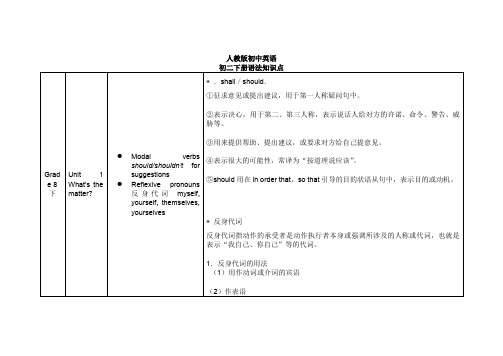
4.动词+副词+介词(其后需加宾语)
5.动词+名词(其后不加宾语)
make a bed整理床铺take place发生make faces做鬼脸
6.动词+名词+介词(其后需加宾语)
It is very kind of you to help me.=You are very kind to help me.你帮我的忙,太谢谢你了。
5.疑问词和不定式连用和疑问词连用的不定式在句中相当于名词,常作主语、宾语、表语、同位语等。
6.省略to的不定式
(1)当两个(或两个以上的)不定式由and,or,than等连接时,通常只需在第一个不定式前用to,其余不定式前的to可省略。
4)当某些结构后的不定式动作与句中某一动作重复时,不定式符号to之后的其他成分可以省略,只保留不定式符号to。常见结构有:be able to,be going to,have to,ought to,used to等。
8.不定式的主动表示被动
①在“be+性质形容词+不定式”结构中。
此类形容词有easy,hard,difficult,interesting,heavy,pleasant,comfortable,safe,dangerous,impossible等。
4.不定式的复合结构不定式用for和of引出逻辑主语,带有逻辑主语的不定式称为不定式的复合结构。不定式的复合结构在句中可作主语、宾语、定语等。
当作表语的形容词表示人的性格、品质时,常用of引出不定式的逻辑主语,否则用for引出。常见的表示性格、品质的形容词有:
good好的kind和蔼的brave勇敢的honest诚实的lazy懒惰的nice好的wise明智的clever聪明的silly傻的stupid笨的foolish愚蠢的right正确的wrong错的rude粗鲁的polite礼貌的fair公正的unfair不公正的careless粗心的careful细心的patient耐心的
- 1、下载文档前请自行甄别文档内容的完整性,平台不提供额外的编辑、内容补充、找答案等附加服务。
- 2、"仅部分预览"的文档,不可在线预览部分如存在完整性等问题,可反馈申请退款(可完整预览的文档不适用该条件!)。
- 3、如文档侵犯您的权益,请联系客服反馈,我们会尽快为您处理(人工客服工作时间:9:00-18:30)。
初二下册英语知识点总结unit 1短语归纳too much 太多lie down 躺下get an X-ray 做个X光检查take one ’s temperature 量体温put some medicine on ......在....上敷药have a fever 发烧.take breaks /take a break 休息without thinking twice 没多想get off 下车take sb to the hospital 送某人去医院wait for等待to one’s surprise 使.......惊讶的thanks to多亏于;由于in time及时think about 考虑have a heart problem患有心脏病get into the trouble 遇到麻烦do the right thing做正确的事情事情fall down 摔倒put ...... on sth把...放在某物上get hit/sunburned 摔伤/烧伤be interested in 对.....感兴趣be used to 习惯于.... take risks/take a risk 挑战lose one’s life 失去生命because of 因为run out of 用完cut off 切除get out of 从...出来make a decision/decisions 做决定be in control of 掌管;管理give up 放弃need to do sth .需要去做某事see sb doing sth 看见某人正在做某事ask sb sth 询问某人某事expect sb to do sth 期望某人做某事agree to do sth 想要做某事help sb (to) do sth 帮助某人做某事want to do sth 想要做某事tell sb to do sth 告诉某人做某事have problems(in) doing sth 做某事有困难use sth to do sth用某物去做某事be/get used to doing sth 习惯于做某事seem to do sth 好像做某事keep on doing sth 继续做某事mind doing sth 介意做某事重要短语:1. make predictions 做预测2. free time 空闲时间3. fly…to…乘坐…飞往…on a space station 在太空站上5. I disagree. 我不同意. 6. fall/be in love with sb. 与sb.相爱7. keep pets 养宠物8. be able to 能够9. predict the future 预测未来10. come true 实现11. see sb. do sth. 看见sb.做某事(的全过程)doing sth. 看见sb.正在做某事(片断)12. help sb. with sth. 帮助某人做某事13. hundreds of 数以百计的14. try to do sth. 尽力做某事15. look like 看上去长的像…16.look for 寻找17. 一段时间+ from now (从现在起)…之后from now on = in the future 今后重要句型:1. Do you think …?I think (that)….I don’t think (that)….2. study at home on computer辨析:on,in和with.on:表示使用通讯工具、信息或传媒,乘坐交通工具等;I don’t want to talk about it on the phone.in:使用语言文字等媒介;Can you speak it in English?with:借助具体的手段或工具。
Don’t write it with a red pen.3. Will people use money in 100 years?“in+时间”结构常与一般将来时连用,对其进行提问时用特殊疑问词how soon.4. before ago 与过去时连用语法:1. The Simple Future tense 一般将来时的三种基本结构:⑴will +V. ⑵be going to +V. ⑶be + Ving一般将来时的时间状语:in + 时间,in the future,next + 时间,与tomorrow 相关的时间,this + 时间,from now on,right now,some day…形容词,副词的比较等级考查热点透视:表示A与B在程度上相同时,“as+形容词或副词的原级+as”结构。
表示A不如B时,可用“not as/so+形容词或副词的原级+as”结构。
表示A比B在程度上“更…..”时,可用“形容词或副词的比较级+than”结构表示三者或三者以上的比较,其中一个在程度上“最…..”时,常用“the+形容词或副词的最高级”结构,后面可带“of/in的短语”来说明比较的范围。
(注意:副词的最高级在句中常省略“the”.)在形容词或副词的比较级前,可以用“a little, even, a bit, much,”的等词语来修饰,以加强语气。
表示“越来越….”时,常用“形容词或副词的比较级+and+形容词或副词的比较级”结构,,对于多音节和部分双音节形容词,副词而言,若要表达此意时,用“more and more+形容词或副词的原级“结构。
在表示“其中最….之一“的含义时,常使用“one of+the+形容词最高级形式+名词复数”结构,其中的定冠词the不可以省略。
表示“越….越….”, 可使用“the+形容词或副词的比较级,the+形容词或副词的比较级”结构。
2 .一般将来时a)一般将来时的构成:由助动词shall或will加动词原形构成,shall用于第一人称。
在口语中,will在名词用”beb)一般将来时的用法:1)表示将要发生的动作或情况;2)不以人的意志为转移,肯定要发生的事情。
The day after tomorrow will be National Day.后天是国庆日。
3. in/after:in是指以现在时间为起点的“在一段时间以后”。
也可以表示“在将来多少时间之内”,句子中的谓语动词要用一般将来时态;after常指以过去时间为起点的“一段时间之后”,所以它与过去时态连用。
当after指某个特定的未来时刻或日期之后,或指以将来某一时间为起点的若干时间之后时,它可以与将来时态连用。
4.more, less, fewer的用法区别:more为many, much的比较级,意为“更多”,可修饰可数与不可数名词。
Less 是little的比较级,意为“更好,较少”,修饰不可数名词。
Fewer是few的比较级,意为“更少”,修饰可数名词复数。
【注意】few, little表示否定“几乎没有”。
a few, a little表示肯定“一点,几个”。
5.would like sth意思为“想要某物“;would like to do意思为”想要做某事“。
回答would like句型的一般疑问句时,其肯定回答为“Yes, please.”;否定回答“No, thanks”或“I’d like /love to, but….”6. Such作形容词,意思是“如此的”“这样的”,修饰各种名词。
➢Such这样的。
如It is such bad weather.天气如此恶劣。
➢Such常和表示结果的that从句搭配,表示“如此….以至于…”如It was such a hot day that we all had to stay at home.➢Such…that…和so…that…都可用来引出一个结果状语从句。
由于such是形容词,所以that从句前有一个受such修饰的名词;而so 是副词,用以修饰形容词或副词,因此that从句前一般不出现名词。
如They are such kind-hearted teachers that people in the village all respect them.The exam was so difficult that many students failed to pass it.a)如果名词是可数名词的单数形式,such和so的位置不同:such+a/an+形容词+单数名词so+形容词+a/an+单数名词b)如果名词是不可数名词或名词复数,只可用such,不能用so.: such+形容词+不可数名词或复数名词c)如果被修饰的不可数名词被much, little, 或复数名词被many, few等表示量的形容词修饰时,用so,不用such.d)当little表示“年纪小的”时,可用such+little+名词。
7.be able to 为“能,会”,表示能力,在这个意义上与can的意思相同,一般情况下两者可以互换,但can 只有现在式和过去式(could)而be able to则用于更多的时态,主要体现在be的变化。
两者在用法上有一些差异:can (could)表示主观能力不表示意愿,它的将来时用will be able to而be able to表示主观意愿强调克服困难做某事。
unit 2知识点:1..loud是形容词,loud-louder-loudest意思是“响亮的”;作副词时,常与talk, sing, laugh 等词连用,如speak loud; loudly “大声地”带有喧闹的意味,常用来修饰shout, cry, call, knock等动词,通常没有比较级和最高级,作状语;aloud 副词,出声地,大声地,仅指发出声音(以使能被听得见)。
2.Enough为形容词,意思是“足够的”;enough +n.修饰名词enough money; adj/adv+enough修饰形容词或副词;enough to do 足够做某事3.present, gift礼物:gift带有一定的感情色彩,通常指昂贵的“礼物”,强调送礼人的诚意,有时有“捐赠”之意,多用于正式场合;present指为表达情谊,敬意或出于礼节,在某特定时刻或场合赠送的“礼物”,此礼物价值不一定高。
make sb a present of把…作为礼物送给4.borrow, lend: borrow“借入,借给”即说话人向他人借东西borrow sth from sb.; lend-lent-lent“借出,借给”即说话人把自己的东西借给他人lend sb sth= lend sth to sb5 except,besides除…之外: except除了…都,besides强调“除了…之外还有…”在no one, nobody, nothing等词后加介词but也表示“除了”。
